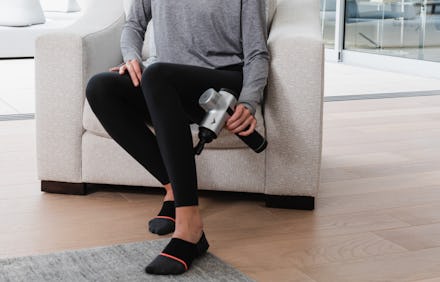Do massage guns really work or are they just another wellness sham?

My first thought when my partner busted out his latest gadget was, “Wow, that’s one heavy-duty vibrator.” The Jawku Muscle Blaster Chrome, a type of device called a massage gun, looks like a power drill and comes with four massage attachments. Yes, it vibrates — but to alleviate soreness and speed recovery, I learned — not to get you off. I wondered, though: Do massage guns work?
Several other massage guns from brands like Achedaway, Hypervolt, and Theragun, have cropped up recently, and they’ve gained a ton of buzz. (See what I did there?) Celebrities, including DJ Khaled and NBA player Kyrie Irving, have been spotted with the Theragun. And as with so many trendy wellness products, these devices don’t come cheap. My partner bought the Jawku Muscle Blaster Chrome for $130, thanks to a promo discount, but it retails at $200, while Theragun’s latest model, the G3PRO, costs $599. The Hypervolt Plus has a decent following, and sits at about $399.
Because the wellness world is a breeding ground for pseudoscience, I should first tell you that there is some science behind the intention of these device. Massage guns purportedly work through vibration therapy, also known as percussion or percussive therapy, which aims to relieve soreness and tightness by transmitting jolts of pressure and vibration into your muscles, CNET explains. A few studies suggest vibration therapy may reduce or even prevent muscle soreness, and others that regular massage and stretching yield the same results.
The problem is, it’s not clear how closely massage guns resemble the vibration therapy in such studies, Michael Fredericson, a sports medicine physician at Stanford Health Care, tells me. Many brands advertise their massage guns as tools that accelerate recovery, but as far as Fredericson knows, there haven’t been any controlled scientific studies that look specifically at these devices that can back up these claims. While he thinks they offer benefits, whether they help recovery remains unclear. One thing's for sure — they feel good as hell to a lot of people, post-run.
“I think what you could say is that it’s similar to a deep tissue massage, and in that way, it has the same benefits,” Fredericson says. “Whether it does anything more than that, I don’t think we really know.”
Deep tissue massage — which is what these guns essentially offer — loosens the muscle tissue, increasing blood flow to it, and helps tight, tense areas relax, Fredericson explains. Relieving muscle tightness is important, since it can lead to imbalances that increase your risk of injury. (For instance, tight pectoral, or chest, muscles can round your shoulders and pull your neck forward.) Some of the athletes he works with at Stanford get deep tissue work once a week to keep their muscles from getting too tight. A massage gun could allow you to reap these benefits as often as you want, without needing to book an appointment with a massage therapist.
Using a massage gun immediately after a particularly grueling workout — say, a marathon or an intense, heavy weightlifting session — might worsen inflammation and soreness.
And while a foam roller can easily reach larger muscles, a massage gun, like deep tissue massage, can get into the nooks and crannies, Fredericson says. I’ve found that I can access the muscles around my shoulder blades more easily with the Jawku than with a foam roller, and my partner’s noticed with same with his knee region. Fredericson adds that massage guns also have stronger motors and reach deeper into the muscle than the previous generation of home massagers.
But he cautions that using a massage gun immediately after a particularly grueling workout — say, a marathon or an intense, heavy weightlifting session — might worsen inflammation and soreness. He prefers to use his massage gun to help him limber up pre-workout, or to relieve stiffness the day after. And unless you can recruit a trainer, partner, or someone else willing to do you a solid, the major downside of a massage gun is that you have to use it on yourself, he says, which means you’re not lying down, utterly relaxed, as you would be with a massage therapist.
A massage gun is basically DIY deep tissue massage, and it can be a helpful addition to other methods you already use to loosen your muscles, like foam rolling, Fredericson says. “Other than that, there’s nothing that fancy about it.”
For me, the main advantage of the Jawku is convenience; it saves me time I would’ve spent contorting my body, and using roller sticks and lacrosse balls to get to hard-to-reach areas. If you work out a ton, have the means, and don’t mind looking a little ridiculous, then a massage gun might be worth it for you, too.